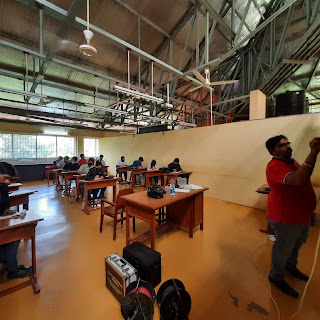Workshop on Geophysical Methods for Groundwater exploration using Resistivity Method held on 21/12/2020
The Department of Geology organized a one day workshop on Geophysical Methods for Groundwater Exploration Using Resistivity Method for the students of SyBSc, Groundwater and Hydrogeology course under DBT star scheme. The objective of the workshop was to cover the theory and practical aspects of geophysical exploration using resistivity meter and to give them an experience of field data collection and interpretation. The workshop was held on 21/12/2020, the resource person for the workshop was Mr. Smitesh Talawadekar, Proprietor and Managing Director of Terra Hydrotech Solutions, which is a geophysical exploration, water management and rainwater harvesting solutions service provider company based in Vasco, Goa. The session was attended by 15 students and one faculty member.
The session began at 10am with a brief introduction of the resource person by Prof Malcolm Afonso. The guest was welcomed with a floral tribute by Mrs Lisa Rodrigues (SyBsc). The entire day was well planned into three parts comprising of: 1. Theory and exercises in the lab, 2. Field exercise and Data collection in the campus and 3. Processing of the data collected using software/table calculation and interpretation of the results.
Mr Smitesh Talawadeker took over the session by quizzing the students with the fundamental concepts of hydrogeology such as local rock types, porosity, permeability and aquifers etc. He emphasized on the need to have a deep understanding of the most basic concepts in geology and how these are applicable to geophysical exploration. He highlighted how deformation in rocks may result in presence of water even in hard rock terrain present in the peninsular region of India. He discussed how rock composition and age of the water can influence its quality. This was followed by an overview of the various geophysical methods for water explorations.
He then covered the fundamental principles of electrical resistivity survey including resistivity and its units, Geometric coefficient, rock properties causing resistivity to vary, measured resistivity, apparent resistivity, electrode configurations used in resistivity surveys such as Wenner and Schlumberger configurations and their merits and demerits. He then explained the data collection table for field exercise. Type curves for different layer systems (Two layer, three layer, four layer) were explained. At the end of the first session students completed numerical exercises in class and the advantages and disadvantages of resistivity survey were discussed.
The second session started at 2pm after lunch. Students prepared a checklist of equipments and proceeded to the field. At first students were explained the safety measures to be taken in account before starting the survey including field gear and correct technique of hammering the electrodes into the ground and communication strategy.
Teams of students took turns in setting up the electrodes while other teams noted the readings; students were also informed about how to identify errors while taking readings.
After data collection, students proceeded back to the lab where they were given a live demonstration of data processing technique using software and the interpretation of the results.
Session concluded with a question and answer session where students enthusiastically discussed about the possibility of doing internship under the resource person. Resource person informed the students that they normally take 2 students from each college however from now onward they will be conduction a descriptive type entrance exam to screen prospective candidates. Mr. Keshav Singh presented the vote of thanks. The session ended at 4pm. The activity was coordinated by Prof Malcolm Afonso.
Part One: Theory and exercises in the lab
Part 2: Field exercise and Data collection in the campus
Part 3: processing of the data collected using software/table calculation and interpretation of the results.










Nice blog post. Thanks for sharing.
ReplyDeleteYou put really very helpful information.
ReplyDeletegeophone and hydrophone
geophysical vibrator